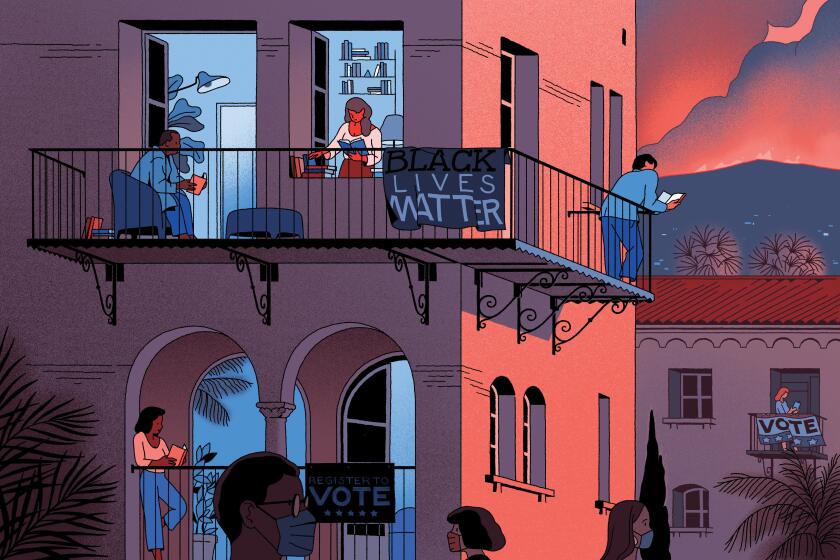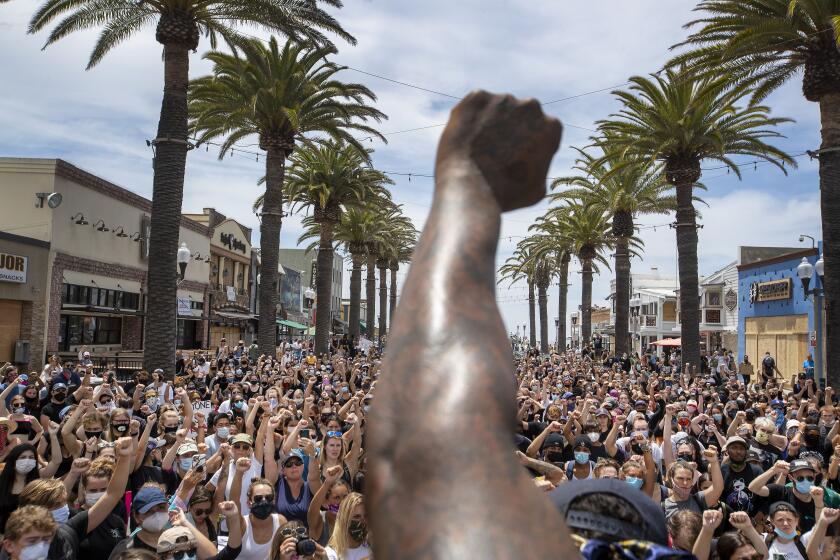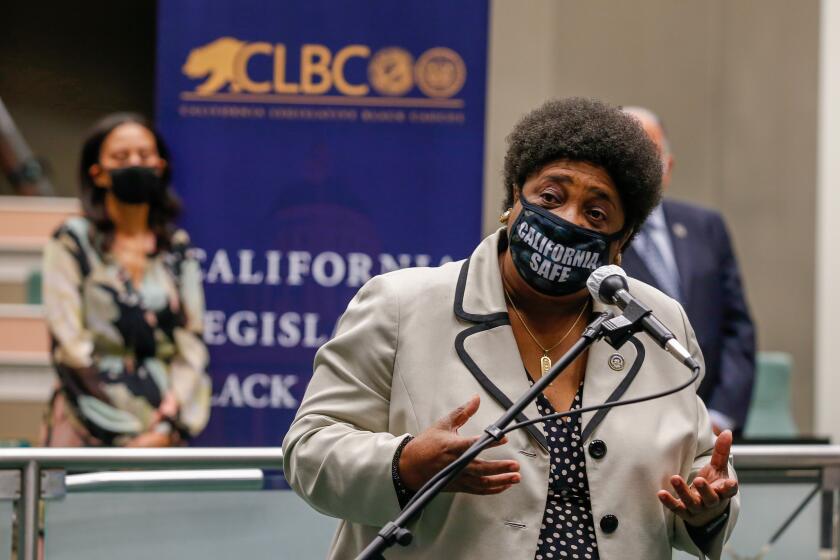Claudia Rankine on Black Lives Matter, Naomi Osaka and justice for all
- Share via
On the Shelf
Just Us: An American Conversation
By Claudia Rankine
Graywolf Press: 352 pages, $30
If you buy books linked on our site, The Times may earn a commission from Bookshop.org, whose fees support independent bookstores.
Uncontained fires spewing ashes and smoke across the continent — the past became prelude again. As with the killings of Latasha Harlins, Amadou Diallo, Trayvon Martin, Sandra Bland, Michael Brown and Philando Castile, Breonna Taylor and her family too were denied justice this fall. Then Supreme Court Justice Ruth Bader Ginsburg passed on, COVID-19 cases rose again, and President Trump desecrated another institution, the presidential debate. Amid renewed calls for truth, reparations and justice, award-winning poet, Yale University professor and essayist Claudia Rankine discussed her newest work, “Just Us” — an urgent talk about a timely book. Below is a condensed version of our wide-ranging conversation.
How and when did you arrive at the title “Just Us,” which of course is also a homonym for “justice”?
Well, the title came early on. I was interested in the “U.S.” inside there as well as the homonym of justice. I am always interested in marrying the personal to the political. People don’t have a sense of every move they’re making being tied to larger decisions. You get a plastic bottle of water, you’re actually entering into a conversation about climate change. So I really wanted a title that was between us, personal and intimate, but opened out to larger issues in the U.S. Later on, I shared the text with the artist Alexandra Bell and she said, “Did you mean to reference the quote from Richard Pryor?” Then I went to the quote and I loved the slipperiness of it and made it the opening epigraph. That “You go down there looking for justice, that’s what you find, ‘Just Us.’” On the one hand he means there are only Black people down there seeking justice, but also it lends itself to the idea that only white people receive justice.
Throughout the book you amplify the entangled nature of Black and white America. How does that understanding help us work toward change?
One of the things I think a lot about is our sitting president. The fact that 62% of white men voted him into office and then a percentage of people didn’t vote as a protest, but in a sense voted for him by not voting. I am interested in what it means for white Americans not to understand that when a person like Donald Trump becomes president, it’s also going to affect them. Do white people understand that a white supremacist agenda is also a fascist agenda? Can we get together and understand that this does not help either of us? So I was interested in how you get to a place where — especially liberal — white Americans claim that they want change in society, but they’re not willing to do anything in their own lives to open up a space for us. Opening up those spaces to everyone can benefit all of us. So I’m hoping now, given the protest this summer, we can get closer to that conversation.
Perhaps no other medium has better helped us process 2020. Our fall books special brings you the books and authors who’ve helped make sense of it.
In the book you detail flying while Black, being a professor while Black — teaching, being married to a white man, getting therapy while Black. I especially noticed your allusion to James Baldwin’s “price of the ticket” as a continued marker and injurious consequence of Black mobility.
This book is positioned very much inside my life, because we are always subject to racism no matter what position we hold in American society. This is not saying I have nothing. I do have some stuff I have worked for my life, but for Black people that doesn’t mean that we can ever fly above the inequities that touch all of our lives. We are still human beings, we still have children we are trying to care for, stresses in our relationships and health issues, and there’s no separating that from the stresses that hit African Americans no matter where they fall economically. I think Baldwin was less interested in that. I think he was more interested in just: How do you get inside the system at all?
“Just Us” also explores the practice of bleaching, showing how the false hierarchy of whiteness requires chemicals and contortions.
I tried to think of a single image of whiteness that was shared by everyone, just as a metaphoric gesture, and blondness was the only thing I could come up with. To me it really is a way of talking about whiteness as a constructed thing. You have Hillary Clinton talking about it herself when she said she got halfway through the first year of Bill Clinton’s governorship without dyeing her hair, but the pressure then made her do it. We see people like Ellen DeGeneres, her hair dyed, Marilyn Monroe. “Just Us” tries to put forward that despite our inevitable entanglement, whiteness has decided there is no reciprocity within the entanglement. It goes one way — toward the centering of whiteness.
Walter Mosley, Luis Rodriguez, the coiner of #BlackLivesMatter and others sketch a hopeful future for L.A. and the U.S. after George Floyd protests.
In the past, you’ve written about Serena Williams. Now you turn to Naomi Osaka, whose Japanese mother was disowned for being with a Haitian man. Now she is the No. 1 female athlete in the world, wearing masks at the 2020 U.S. Open with the names Breonna Taylor, Philando Castile, George Floyd, Ahmaud Arbery. What does her story bring to this conversation?
I wanted to show how anti-Blackness was not owned by the U.S. They didn’t take out a patent. That question of, “Is there any escape from this for Black people?” There’s not. Naomi Osaka has in many ways become the next generation of the Williams sisters, in that she is much more cognizant than some of the younger Black tennis players, like Sloane Stephens or Taylor Townsend, who have remained much more silent. Serena’s match against Naomi in 2018 was a really moving moment, where we saw Osaka play a game very similar to Serena’s, but she’s younger, she’s a little bit faster, and this person was her mentor. I felt that even as Serena was upset during that match, she was able to embrace Naomi, because the fans were able to embrace Serena. They supported Serena and then Serena supported Osaka. It showed you how reciprocity can work. To see now Osaka moving into the arena of protest and literally by herself shutting down the tournament before the U.S. Open — it’s nice to see her take the mantle.
I have been working with Congresswomen Barbara Lee and Sheila Jackson Lee to establish Truth and Reparations commissions. So when I arrived at the moment in your book about needing R&R, reparations and reconstruction, it deeply resonated. What are your thoughts on the movement, now that California has become the first state to begin studying reparations proposals?
I’m waiting to see: Will all of the work that was done this summer actually play itself out into real systemic change? We saw a lot of support go to Black Lives Matter. We saw a lot of declarations of reflection from corporate America, and so I’m really interested in seeing what that will mean going forward. We’re starting to ask important questions about what it has meant to be in ally-ship and how that looks, and where do I fit in, and what are we going to do now?
In a year of national protests against racial injustice, state lawmakers approved Assembly Bill 3121 to force the state to begin to confront its racist history and systemic disparities that persist today.
I always like to end with love. What is the power of love in this moment?
Cornel West says: “Justice is how love shares itself in public.” That is my favorite quote ever. Justice, as reparative as reconstructive, is the love we’re waiting for. There are ways to open out the system to include us, and I think we are beginning to see those choices made. We’ll see how committed people are. We are also seeing choices against us, so let’s not get too comfortable.
Hunter is a professor of sociology and African American Studies at UCLA. He is the author of four books including “Radical Reparations,” forthcoming from HarperCollins/Amistad.
More to Read
Sign up for our Book Club newsletter
Get the latest news, events and more from the Los Angeles Times Book Club, and help us get L.A. reading and talking.
You may occasionally receive promotional content from the Los Angeles Times.











